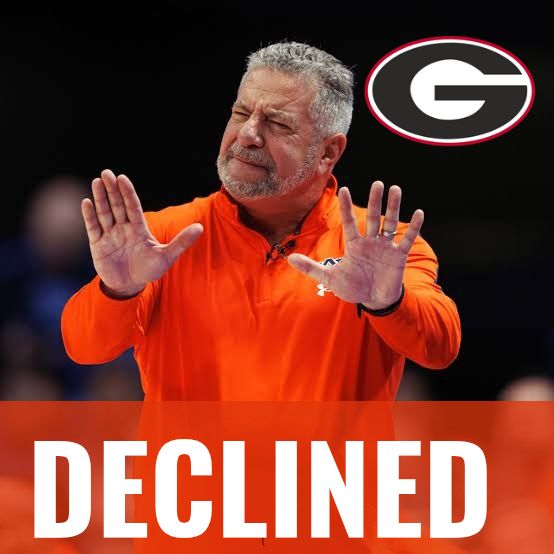
Bruce Pearl’s Decision to Decline Georgia’s Offer: A Strategic Move in College Basketball
In a significant turn of events in the college basketball landscape, Bruce Pearl, the acclaimed head coach of the Auburn Tigers men’s basketball team, has reportedly declined an offer from the University of Georgia to take over their men’s basketball program. This decision has sent ripples through the sports community, prompting discussions about Pearl’s career trajectory, the state of Georgia’s basketball program, and the broader implications for college basketball coaching dynamics.
Bruce Pearl’s coaching journey is a testament to resilience, adaptability, and an unwavering commitment to excellence. Born on March 18, 1960, in Boston, Massachusetts, Pearl’s early life was marked by a passion for basketball. He played college basketball at Boston College before embarking on a coaching career that would span several decades and institutions.
Pearl’s first head coaching position was at Southern Indiana, where he led the team to a Division II national championship in 1995. This success set the stage for his subsequent roles at Milwaukee and Tennessee. At Tennessee, Pearl gained national prominence, known for his energetic coaching style and ability to turn programs around. However, his tenure at Tennessee ended controversially due to NCAA violations, leading to a three-year show-cause penalty.
In 2014, Pearl returned to coaching at Auburn University. Since then, he has revitalized the Tigers’ basketball program, leading them to multiple NCAA Tournament appearances and a Final Four berth in 2019. Under his leadership, Auburn has become a formidable force in the Southeastern Conference (SEC), consistently competing at a high level.
The University of Georgia, home to the Bulldogs, has long been in search of a coach who can elevate its men’s basketball program to national prominence. Despite a rich athletic tradition, Georgia’s basketball team has struggled to achieve sustained success, often falling short in the competitive SEC.
In light of this, Georgia’s athletic department reportedly identified Bruce Pearl as a prime candidate to lead the program. Pearl’s track record of success, particularly in the SEC, made him an attractive option. The university’s offer was said to be financially lucrative, potentially doubling his current salary at Auburn, which is approximately $5.9 million per year under an eight-year contract initiated in 2022 .
This substantial offer underscored Georgia’s commitment to revitalizing its basketball program and its recognition of Pearl’s capabilities as a coach.
Despite the allure of a more lucrative position at Georgia, Bruce Pearl has reportedly declined the offer. This decision is multifaceted, reflecting both personal and professional considerations.
- Commitment to Auburn: Pearl has deep ties to Auburn University, both professionally and personally. He has been with the Tigers for over a decade, leading them to significant achievements, including a school-record 32 wins and a Final Four appearance in the 2024–25 season . His loyalty to the program and its community likely played a pivotal role in his decision to remain.
- Stability and Success: Auburn’s basketball program is currently experiencing a period of unprecedented success. The team’s performance under Pearl’s guidance has been stellar, and the prospect of continuing to build on this success may have outweighed the potential benefits of a new challenge at Georgia.
- Personal Considerations: Coaching at Auburn has allowed Pearl to establish a strong rapport with players, staff, and the local community. The relationships and support systems in place at Auburn may have influenced his decision to stay.
- Strategic Career Move: By declining Georgia’s offer, Pearl positions himself as a sought-after commodity in college basketball. This move could enhance his negotiating power for future contracts and opportunities, both within and outside the realm of college basketball.
Georgia’s pursuit of Bruce Pearl highlights the university’s ambition to elevate its men’s basketball program. However, Pearl’s decision to stay at Auburn leaves Georgia in a challenging position. The Bulldogs will need to continue their search for a coach who can bring the same level of success and energy that Pearl has demonstrated at Auburn.
The situation also underscores the complexities involved in hiring a new coach. Financial incentives alone may not be sufficient to persuade a coach to leave a stable and successful program. Factors such as institutional support, community ties, and personal preferences play significant roles in such decisions.
Bruce Pearl’s decision has broader implications for the college basketball coaching landscape. It reflects the increasing influence of financial considerations in coaching decisions. As programs vie for top talent, the financial packages offered to coaches are becoming more substantial.
Additionally, Pearl’s choice underscores the importance of institutional culture and support in a coach’s decision-making process. A program’s commitment to its coach, the resources available, and the community’s engagement can be as compelling as financial incentives.
Bruce Pearl’s decision to decline Georgia’s offer to become their men’s basketball head coach is a significant development in the world of college basketball. It reflects his commitment to Auburn University, his strategic career planning, and the complex factors that influence coaching decisions. As the college basketball landscape continues to evolve, Pearl’s story serves as a reminder of the multifaceted nature of coaching careers and the delicate balance between ambition, loyalty, and opportunity





